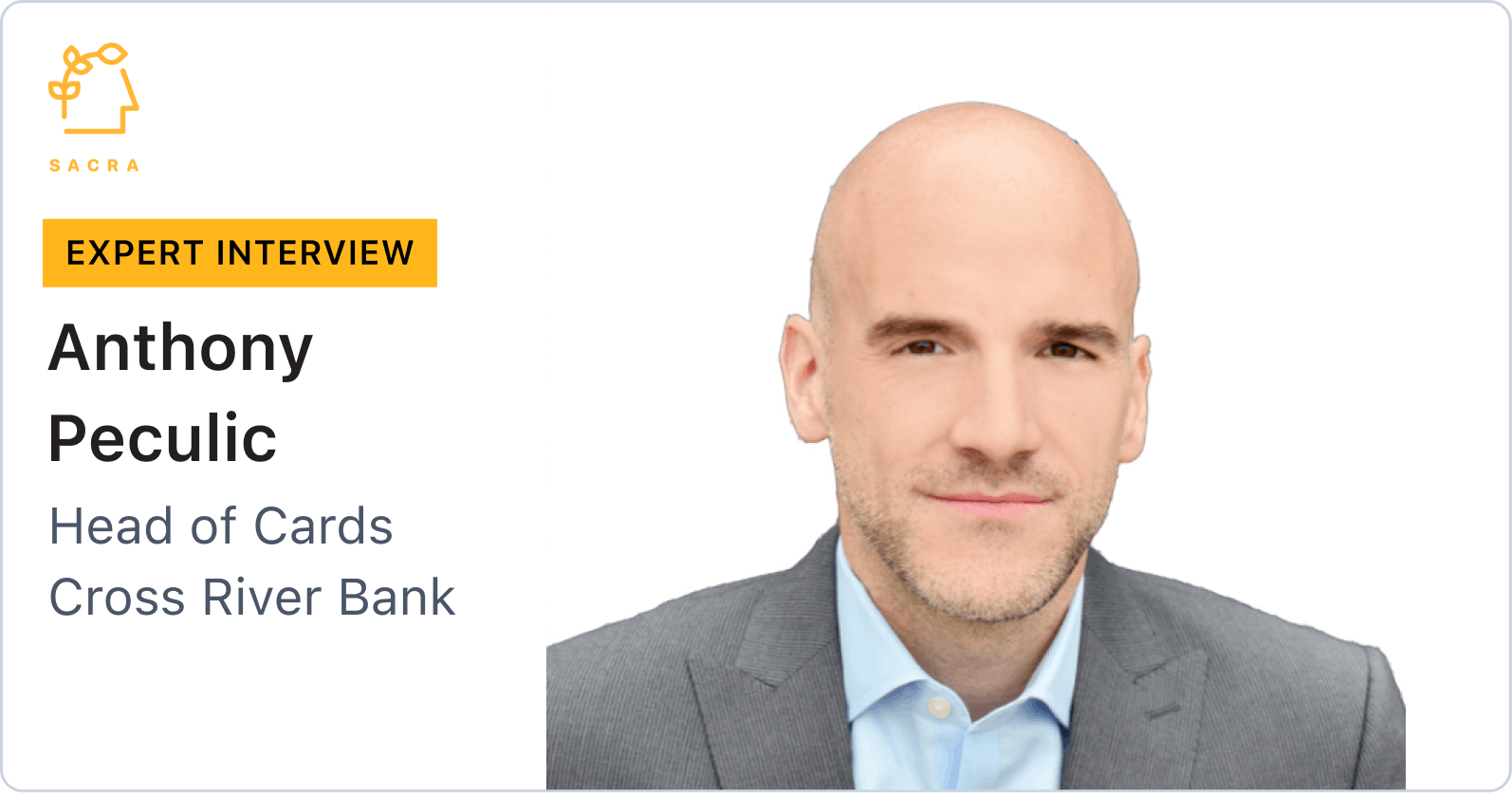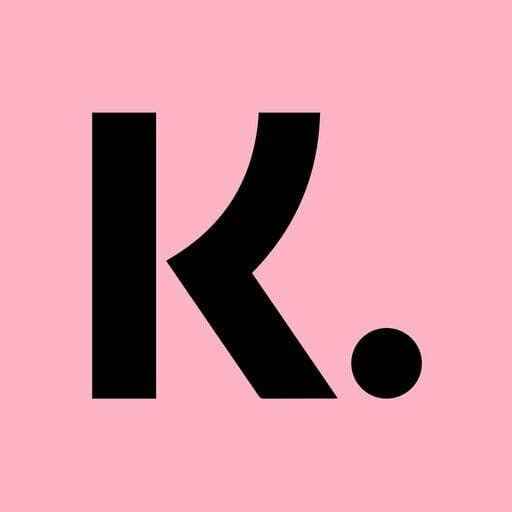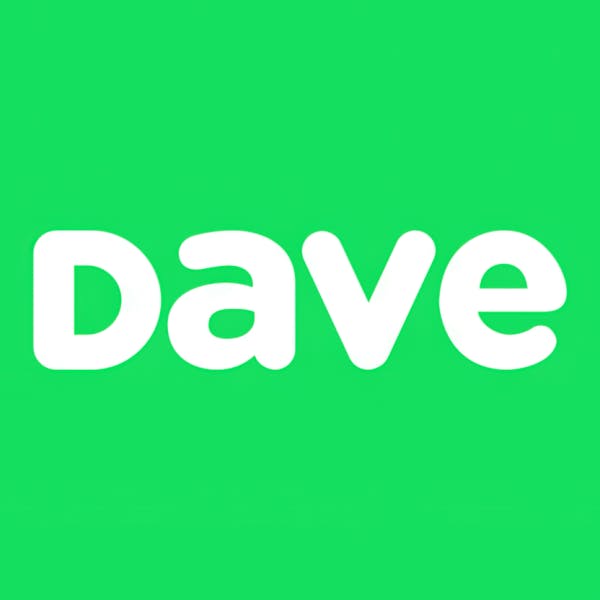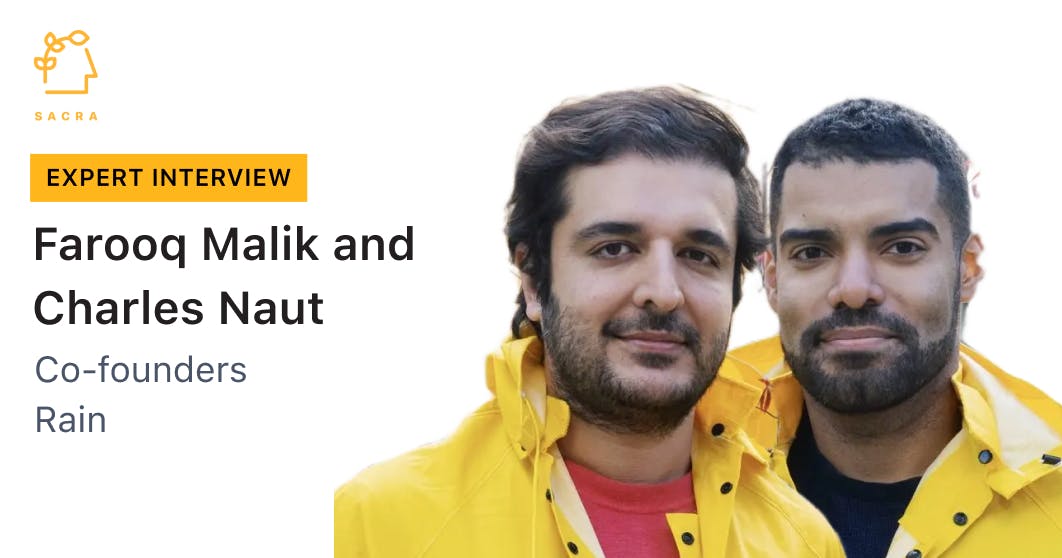Anthony Peculic, Head of Cards at Cross River Bank, on building a fintech one-stop shop
 Walter Chen
Walter Chen

Background
Anthony Peculic is the Head of Cards at Cross River Bank. We talked to Anthony to learn more about the growing use cases and utility of card issuing, how to think about Cross River's positioning with respect to companies like Stripe and Marqeta, and whether the growing trend of fintechs getting bank charters is likely to continue.
Questions
- What’s your take on banking-as-a-service in 2022? How have you seen it evolve over the last few years, and where do you think it's headed?
- Can you talk about how you see a breakdown of how you see the BaaS space, the different types of players, and where you see Cross River positioning itself?
- Can you talk a little bit about Stripe in the context of what you guys do? I find that when I chat with folks, they're often confused as to this “frenemy” dynamic where Cross River might be a partner with Stripe on some things, and they might be competitive on others.
- Can you talk about how one can be both a one-stop shop but also partner with best-in-breed versus the approach of one or the other?
- When I talk to folks about Cross River, they know it for its lending and for early partnerships with Affirm and companies like that. Can you talk about the cards business and where you're seeing growth, the opportunity, and what excited you about joining Cross River to lead cards?
- I know you came from ADP. Where do you slot in these vertical SaaS or vertical finance products like Gusto Wallet? Do those slot into what you were talking about with neobanks, or is it something different?
- Can you position Cross River on cards with respect to the Marqetas of the world? Also, I’m interested in some of these up-and-coming ones like Lithic and Cardless, particularly with this developer-centric mantra that seems to be very popular in the fintech space.
- Could you talk about the trend toward a lot of fintechs getting bank charters? Do you think that the end state is that every fintech does become a bank, and that is just going to happen?
- I'm curious to learn more about the culture at Cross River because bringing together top-notch technology and top-notch services is a huge challenge that many who come from the technology world maybe don't appreciate. Can you talk about the culture of Cross River with respect to this old-school-meets-new-school profitable business in the fintech world, which is a lot of fast-growing but unprofitable companies and technology-centric folks?
- Switching gears a bit to crypto, I'd love to hear about how the early partnership with Coinbase was really big for Cross River, and now a lot of people know Cross River is an important infrastructure for crypto companies. Can you talk about some of the crypto use cases today that are seeing a lot of traction or getting you particularly excited, especially as they might intersect with cards?
- How do you think about partnering with the next generation of DeFi-backed companies, and how do you mitigate the risk of contagion from what we're seeing in crypto over to traditional finance?
- Cross River is one of the leading, if not the leading vertically-integrated fintechs. Can you talk about how you think about your moat internally, how you think about your competitive advantage?
Interview
What’s your take on banking-as-a-service in 2022? How have you seen it evolve over the last few years, and where do you think it's headed?
Banking-as-a-service is a more modern term, but obviously, the sponsorship model has been around for quite a while, especially on the debit side.
Recently, you've seen an evolution of it. It started with prepaid debit, where we had a lot of leveraging different services from different providers. Now we’re seeing credit cards as a service, for example from platforms like Deserve, Railsbank, and various others that are in the space.
You're definitely seeing a broader range of solutions that are coming through, not just from a card perspective but in banking in general.
If you look at the holistic set of products we do at Cross River, it's not just about issuing cards—it's about moving money and making sure you have all the rails needed to get money to where it needs to go.
In addition to debit and credit, you also need to have lending capabilities: you need to have that infrastructure in place where a loan could be provided, could be dispersed, and could be leveraged potentially by an account. Now, crypto is coming into place.
The evolution has really broadened where you can go with these financial services, which is really exciting because nowadays you can go to several players like ourselves to get all you need. It's almost like a one-stop shop approach.
I think we'll continue to see additional services being added to players such as ourselves as we look to broaden and think about all the things we need, or our customers need, to really be successful.
Can you talk about how you see a breakdown of how you see the BaaS space, the different types of players, and where you see Cross River positioning itself?
We see ourselves as the center of it. Not a surprising answer, but it's true.
All jokes aside, if you think about what banking as a service truly requires or needs in order for you to provide what you need, it does break down as the components I said earlier.
It's basically account components of anything from checking and savings accounts to debit, credit, prepaid wallets, digital wallets, or anything of that sense. Then you have money movement aspects, what we call payments—real-time payments, push to cards, ACH, same-day ACH, the Fed now coming, all these other things that we're looking at and everybody's looking at.
It's providing the ability to move the money, and it's also providing the ability to lend, whether it be credit card balances or providing debt facilitation for that, and not to mention all the things you need on the back end to support all of that.
Where we see ourselves is a mix of technology.
We've built our own bank core for the specific purpose of ensuring you have a modern platform you can integrate easily with APIs.
We’ve also added on additional products and services you need or will need to provide what you do because otherwise, you're going to have to look for that somewhere else.
The last piece, and one of the most critical, is compliance. Having a robust compliance program is a key part of this that keeps you out of trouble and ensures that you're building and thinking about the user experience in a different way.
Can you talk a little bit about Stripe in the context of what you guys do? I find that when I chat with folks, they're often confused as to this “frenemy” dynamic where Cross River might be a partner with Stripe on some things, and they might be competitive on others.
Stripe is a great partner of ours. I don't say a competitor because again, you have to think about the different players and how we operate. We are essentially the financial institution in the back, and regardless of what you do, whether you're Stripe or anybody else offering a platform, you still need a bank or at least the bank license. We feel we are out there to partner with whoever wants to partner with us.
In saying that, I'm not naive to the fact that not everybody's going to use everything we offer, and that's okay too. We're not all-in-one. If someone wants to do one product with us but not the others, we're okay with that.
If someone issues with us, we're hoping that they're going to do payments with us and everything else, but they may already have those in place. That's fine. We're not mandating or dictating that every component or everything has to be done with us. We're willing to provide the one solution or multiple solutions that they may need.
Can you talk about how one can be both a one-stop shop but also partner with best-in-breed versus the approach of one or the other?
Businesses in the market have different levels of maturity. If you’re a fintech start-up or a non-fintech organization trying to get into fintech, you most likely need that all-in-one upfront.
When you're a Stripe or another larger fintech, you’ve been doing this for a long time. You have the infrastructure in place. You're either adding an additional product or potentially replacing one.
We’d like to replace everybody's existing infrastructure—we want to be seen as a valuable partner and have people bring everything to us.
But we also know that with players that have been around for a long time, we’re going to do it component-by-component sometimes.
When I talk to folks about Cross River, they know it for its lending and for early partnerships with Affirm and companies like that. Can you talk about the cards business and where you're seeing growth, the opportunity, and what excited you about joining Cross River to lead cards?
For me, I see tremendous value in being able to provide the solutions that we do at Cross River. That's number one.
Secondly, I think there are few organizations that can bring the people and experience we bring to the table.
Cards and the sponsoring of cards is a relatively new business for us. We've seen a tremendous amount of growth, but what we're excited about is how it completes the puzzle in terms of where fintechs are going.
At the end of the day, there's always a need. I always say, "You still have to use your money." There has to be a way to use it. There's no better way, in my opinion, to do that than with a card of some kind.
In terms of what we're seeing and what our strategic focus will be, there are definitely a few big themes.
For one, credit cards have made a huge comeback. When I started in payments, credit cards were growing tremendously. Then that kind of stopped and all of a sudden prepaid became the hot commodity.
Credit cards have now made a big comeback because people have become more creative with them. No disrespect to larger banks or anything of that nature, but the credit card has not evolved much in 20 years. You had your traditional rewards card—points, miles, cash back—you had just a standard low APR card, and then you had a secure card. That was fundamentally what credit cards were.
Now, we're seeing some more creative products: for example, with credit building. Unfortunately, because of the economic situation, that opportunity's probably getting bigger. The need to rebuild credit is still tremendously high in this country. We have a lot of desire for that product, which we definitely see as a graduation vehicle to an unsecured traditional credit card.
The other piece that's becoming very popular or we're getting a lot of traction on is crypto. We have your cryptophiles and your crypto fans that definitely want to get cash back. The other side of it ties into the bigger category of what I'm going to call asset securitization or asset backing. We're seeing players use everything from monetary assets to physical assets to come up with collateral or to be backing a credit line of some kind or to boost a credit line. It's incredible.
This also ties to credit building in a way. If you have a car, it has a certain value. Can you use some of that car to be a way back to giving me a $5,000 credit line or a home? There's been a tremendous amount of demand for that product. We have some clients that are going to be launching soon and announcing they are going to be doing that in different ways.
There’s also the rise of more innovative rewards on the credit side. We're seeing health and wellness products out there. We're talking about green initiatives to help with climate change or charitable functions.
The last is on the debit side. Debit is still the preferred method of payment. We certainly are very supportive of it, and we're still selling it because I do feel from a long-term perspective, the neobanks that offer multiple products—debit, credit, and potentially lending and other products—are going to be the ones that probably survive to ensure they have profitability and the diverse portfolio to withstand whatever changes in the economy.
I know you came from ADP. Where do you slot in these vertical SaaS or vertical finance products like Gusto Wallet? Do those slot into what you were talking about with neobanks, or is it something different?
They do. In coming from ADP, I always used to say, "Don't talk about the solution, where it's coming from, but about who it's going to."
We had an ADP Wisely card that was the bank account for the individual. People were doing everything with them. They were paying their bills, and they were driving for Uber and getting instant funding to this card. Essentially, it became their bank.
Earned wage access is a great product, and it's a valuable product. There are different ways to do it, and there are different compliance aspects to it, but generally, it's addressing a major need of the country. People don't have enough money to live. That's one of the biggest issues, and the reason why I talk about credit building passionately is because a lot of this comes from the lack of access to credit.
If you don't have access to credit, you don't have a credit card. Well, what do these folks do? They used to get payday loans or borrow money from a lot of shady places, but now they have all these great tools out there. The maturity and the market have provided such great opportunities. I do think neobanks that understand the needs and focus on that to drive adoption are the ones that are the most successful for sure.
Can you position Cross River on cards with respect to the Marqetas of the world? Also, I’m interested in some of these up-and-coming ones like Lithic and Cardless, particularly with this developer-centric mantra that seems to be very popular in the fintech space.
We see all of those players as partners or potential partners.Cardless is more of a platform player, providing co-brands, and Marqeta is a processor, but they also provide additional services.
I want to partner with as many services as possible because I do think we could bring value that those players don't—all the banking services, all the things that they cannot do, that's what we're here for. That’s fundamentally our strategy. We're willing to work with whatever partners our clients want to bring to the table, or we could potentially refer them to various partners, whether that be processors or even brand associations, like Visa, MasterCard, Amex, Discover, whatever it might be. Our intention is to have a broad approach to this and to be a solution with our customers as to what's in their best interest.
Could you talk about the trend toward a lot of fintechs getting bank charters? Do you think that the end state is that every fintech does become a bank, and that is just going to happen?
I don't think so. I can't emphasize enough—and I'm talking people out of it—but it is a very lofty goal. I think a lot of times that it seems great in theory. For some players, it may make sense. For a lot, it probably won't. My experience in working with programs and looking at this (I did this at ADP and at other places) where we're saying, "Okay, what can we bring in house?" You know, banking is one of those things where you need scale to make sure, from an economics perspective, it makes sense. You need to build a tremendous amount of people and technology. And you have to have a core system.
Now, you can always use a third party. But if you really want to be innovative, building that is a lot of work, and it takes a lot of effort, almost essentially like building a processor in-house, which is a ton of work. You know, there's Square, and there are others who are doing it, but I do think that most probably, when they start looking at this, will realize, "Okay, this is probably a bit too much for us." It just makes sense to continue the model that's there today, at least from a banking perspective.
I'm curious to learn more about the culture at Cross River because bringing together top-notch technology and top-notch services is a huge challenge that many who come from the technology world maybe don't appreciate. Can you talk about the culture of Cross River with respect to this old-school-meets-new-school profitable business in the fintech world, which is a lot of fast-growing but unprofitable companies and technology-centric folks?
I’d start with the culture, and I think it comes from the top. So Gilles, our CEO, every time you hear him speak—and I've been here for a few months—it’s very clear what the culture is and was and will be. We are always customer first, but I think it goes beyond that because everyone will say that. It's really about our focus. If you're in meetings in our company internally, we always think about how do we make things better for the customer? More so than even ourselves. We would do whatever it takes to get there. The key to that is relationships.
If we call it old school or not, to me, it's an important part of us. It’s the relationship piece. We want to know our customers, we want to understand their needs, we want to work with them, and we get to know them personally, too. Like I said, we have had some great relationships over the decade that we've been around. In terms of profitability in this space, I think we all learn. Diversification and thinking about what's coming and taking those opportunities to address what's there are the reasons why companies like ourselves are surviving and usually thrive. It’s because we hear the pulse of what's happening, and we make sure we work with our customers. We listen to them, but we also provide them with some guidance. Or, I would say, not guidance, but more giving them insight into like, "Look, this is what happens in this kind of situation. These are the things you may want to consider." That puts us in a different spot than probably a lot of players in our space—we’re really focused on that.
Secondly, the technology is critical. You don't have to have as many people and resources doing some of the manual work on the back end when you have an API-focused and a very great technology stack to support the clients on a day-to-day basis. Having that makes you more efficient and makes you get things done in a quicker, better way. I think, too, compliance plays a key thing. Everyone thinks of compliance as business killers. It's not fair to them.
They're, first of all, very good people. We all give them our time as businesspeople. But really, they are so critical to what we do and to our success, and our folks are solutions to people. We don't go in and say, “No.” We go in and say, "Hey, you may want to think about doing it this way, or can we do it another way?"
Our job is to make sure we get the job done. I will say what we are focused on is, it's technology, it's the relationships, the people, it's compliance. It's a foundation of all that and a diversified product set that addresses needs.
Switching gears a bit to crypto, I'd love to hear about how the early partnership with Coinbase was really big for Cross River, and now a lot of people know Cross River is an important infrastructure for crypto companies. Can you talk about some of the crypto use cases today that are seeing a lot of traction or getting you particularly excited, especially as they might intersect with cards?
We are constantly evolving our strategy, and we've definitely looked at it over time. We do have a long-standing partnership with Coinbase, which has evolved over the years. It’s leveraging some of the tools we have, including our ability to build accounts, provide some kind of lending, and various other things. So, from a crypto perspective, I think there are a couple of things.
One, there could be opportunities to look at the lending space with crypto. What does that look like? Whether it's lending off of assets or whatever it might be. I think also there's going to be the traditional conversion of crypto to fiat, which we support today in some way.
Second, there's going to be money movement pieces. How do you get money moved from one to the other? I think there's going to be opportunities for payments for crypto. We don't see it as much in the US. We know there are programs launched outside the US; we're keeping track of those.
Third, we want to see how we can also play in that space where you can directly pay for things, almost like a network. Instead of dollars, you're using Bitcoin. There's a demand for that.
I think fundamentally, the answer is that we evolve our strategy, and we're constantly looking because we’re talking to the market, we're engaged in the market. We want to do what we think makes sense. We're going to be careful, and we're going to be compliant, but we want to be innovative. We want to get there as quickly as we can because that's what our customers expect of us.
How do you think about partnering with the next generation of DeFi-backed companies, and how do you mitigate the risk of contagion from what we're seeing in crypto over to traditional finance?
I think the answer's going to be a balance. You mentioned risk, right? This is where I say, like our compliance team, from a solutioning perspective, we will establish where we feel we're comfortable or we think we could be comfortable with certain situations.
From a high-level perspective, I think the answer is we don't know. We don't know to what extent. There’s still a lack of regulation in this space in general. Our teams are working through that, talking to regulators, and talking to everyone to get a sense of where we are. Obviously, we are our bank. So we’re going to do it and make sure within the guidance of what we need and how we're doing it in an appropriate way. As I said earlier, our clients' or customers' interests are most critical to us.
Cross River is one of the leading, if not the leading vertically-integrated fintechs. Can you talk about how you think about your moat internally, how you think about your competitive advantage?
You're going to see a push from us to be there in the front as much as possible in a thoughtful way.
Everybody's going to start catching up on the technology side. We still have an advantage. We still have our own bank core, and that's a huge advantage for us because we can be really flexible and maneuver and add what we need as we need it and not rely on larger third parties.
I also think coming in with experience and guidance is going to be key. In the card space, there are a lot of moving parts. You have to navigate, and people don't realize that. They come into it, "Oh, I integrate to a few APIs, and I send a few cards out." It's not that easy.
Having a partner that understands that and has the technology to back it is going to be a big element of our success as a whole.
Where the market is going to end up is hard to say. The fintech space is very creative. It's innovative. I think we're going to see more leveraging older products or existing products in different ways. It's like with credit cards—what else can you do with a credit card? Or the concept of the credit card? You could pay bills with it. There are all these different things that we're working through, and I think that's going to be the same across all our product sets.
What's fundamental to that is that we are improving the lives of Americans. That is a key focus for us at Cross River. Our CEO talks about it every time he speaks. At the end of the day, we're serving communities or areas which weren't served before that people didn't want to, whether they be banks or others. That's what we're willing to do. I think that all of the things we're doing in some way are providing a service right to an individual customer that probably would've never gotten it if we didn't exist. And that's what we're going to continue to do.
Disclaimers
This transcript is for information purposes only and does not constitute advice of any type or trade recommendation and should not form the basis of any investment decision. Sacra accepts no liability for the transcript or for any errors, omissions or inaccuracies in respect of it. The views of the experts expressed in the transcript are those of the experts and they are not endorsed by, nor do they represent the opinion of Sacra. Sacra reserves all copyright, intellectual property rights in the transcript. Any modification, copying, displaying, distributing, transmitting, publishing, licensing, creating derivative works from, or selling any transcript is strictly prohibited.










